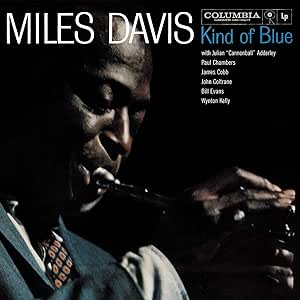“Kind of Blue” is a landmark album in the history of jazz, recorded by Miles Davis and released in 1959. This masterpiece is often hailed as the best-selling jazz record of all time and marks a pivotal moment in the evolution of jazz music. The album is renowned for its innovative approach to harmony and improvisation, utilizing modal jazz techniques as opposed to the more traditional chord progression-based bebop style that dominated the era.

Miles Davis, with his visionary approach, assembled an extraordinary ensemble of musicians for the recording of “Kind of Blue.” The lineup included John Coltrane and Cannonball Adderley on saxophones, Bill Evans and Wynton Kelly on piano (Evans being the primary pianist and Kelly appearing on one track), Paul Chambers on bass, and Jimmy Cobb on drums. The synergy and individual expertise of these musicians contributed to the album’s profound impact and timeless appeal.
“Kind of Blue” consists of five tracks, each characterized by its modal framework, allowing the musicians extensive creative freedom. The compositions—”So What,” “Freddie Freeloader,” “Blue in Green,” “All Blues,” and “Flamenco Sketches”—are considered quintessential jazz standards today. The album’s relaxed, yet deeply emotional atmosphere is captivating, with Miles Davis’s trumpet playing a leading role in defining its sound.
The influence of “Kind of Blue” extends beyond jazz, affecting a wide range of music genres and inspiring countless musicians and composers. Its contribution to music theory, particularly in jazz education, is significant, with its modal approach providing a new pathway for improvisation and composition.
“Kind of Blue” is not just an album; it’s an essential listening experience that epitomizes the essence of jazz. Its legacy is a testament to the genius of Miles Davis and his collaborators, offering an enduring blueprint for musical innovation and expression. The album’s significance in music history cannot be overstated, as it continues to inspire and resonate with listeners and musicians alike, more than six decades after its release.


コメント